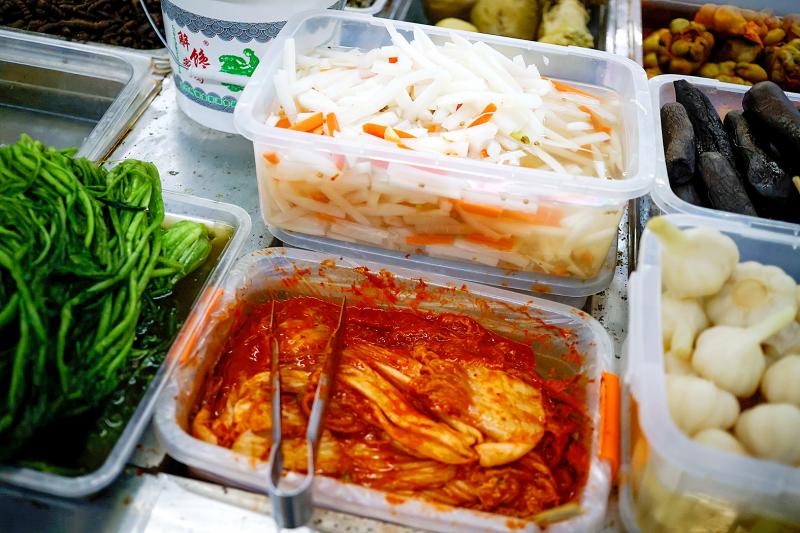China’s efforts to win an international certification for pao cai, a pickled vegetable dish from Sichuan Province, is turning into a social media showdown between Chinese and South Korean netizens over the origin of kimchi, a staple Korean cuisine made of cabbage.
Beijing recently won a certification from the International Organization for Standardization (ISO) for pao cai, an achievement the state-run Global Times reported as “an international standard for the kimchi industry led by China.”
South Korean media was fast to dispute such a claim and accuse the bigger neighbor of trying to make kimchi a type of China-made pao cai.

Photo: Reuters
The episode triggered anger on South Korean social media. “Its total nonsense, what a thief stealing our culture!” a South Korean netizen wrote on Naver.com, a widely popular Web portal.
“I read a media story that China now says kimchi is theirs, and that they are making international standard for it. It’s absurd. I’m worried that they might steal hanbok (South Korea’s national dress) and other cultural contents, not just kimchi,” said Kim Seol-ha, a 28-year old in Seoul.
Some South Korean media even described the episode as China’s “bid for world domination,” while some social media comments flagged concerns that Beijing was exercising “economic coercison.”
On China’s Twitter-like Weibo, Chinese netizens were claiming kimchi as their country’s own traditional dish, as most of kimchi consumed in South Korea is made in China.
“Well, if you don’t meet the standard, then you’re not kimchi,” one wrote on Weibo. “Even the pronunciation of kimchi originated from Chinese, what else is there to say,” wrote another.
South Korea’s agriculture ministry on Sunday released a statement saying mainly that the ISO approved standard does not apply to kimchi.
“It is inappropriate to report (about pao cai winning the ISO) without differentiating kimchi from pao cai of China’s Sichuan,” the statement said.

On April 26, The Lancet published a letter from two doctors at Taichung-based China Medical University Hospital (CMUH) warning that “Taiwan’s Health Care System is on the Brink of Collapse.” The authors said that “Years of policy inaction and mismanagement of resources have led to the National Health Insurance system operating under unsustainable conditions.” The pushback was immediate. Errors in the paper were quickly identified and publicized, to discredit the authors (the hospital apologized). CNA reported that CMUH said the letter described Taiwan in 2021 as having 62 nurses per 10,000 people, when the correct number was 78 nurses per 10,000

As we live longer, our risk of cognitive impairment is increasing. How can we delay the onset of symptoms? Do we have to give up every indulgence or can small changes make a difference? We asked neurologists for tips on how to keep our brains healthy for life. TAKE CARE OF YOUR HEALTH “All of the sensible things that apply to bodily health apply to brain health,” says Suzanne O’Sullivan, a consultant in neurology at the National Hospital for Neurology and Neurosurgery in London, and the author of The Age of Diagnosis. “When you’re 20, you can get away with absolute

May 5 to May 11 What started out as friction between Taiwanese students at Taichung First High School and a Japanese head cook escalated dramatically over the first two weeks of May 1927. It began on April 30 when the cook’s wife knew that lotus starch used in that night’s dinner had rat feces in it, but failed to inform staff until the meal was already prepared. The students believed that her silence was intentional, and filed a complaint. The school’s Japanese administrators sided with the cook’s family, dismissing the students as troublemakers and clamping down on their freedoms — with

As Donald Trump’s executive order in March led to the shuttering of Voice of America (VOA) — the global broadcaster whose roots date back to the fight against Nazi propaganda — he quickly attracted support from figures not used to aligning themselves with any US administration. Trump had ordered the US Agency for Global Media, the federal agency that funds VOA and other groups promoting independent journalism overseas, to be “eliminated to the maximum extent consistent with applicable law.” The decision suddenly halted programming in 49 languages to more than 425 million people. In Moscow, Margarita Simonyan, the hardline editor-in-chief of the